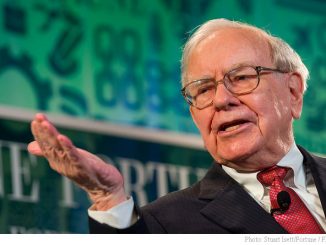For a man who is famously plain-spoken about his thoughts on business and investing, Warren Buffett can be surprisingly stingy with information that is pretty important to his fellow Berkshire Hathaway (BRK.A) shareholders.
Buffett disclosed in his annual investor letter last weekend that Berkshire’s board has selected someone to succeed him as CEO when he eventually retires. But the 81-year-old Sage of Omaha has refused to say who that person is. In fact, Buffett told CNBC that not even the designated successor has been informed. Buffett would say only that the person in question is “an individual to whom [the directors] have had a great deal of exposure and whose managerial and human qualities they admire.”
That would be all well and good, if Berkshire Hathaway were the private preserve of Buffett and the directors, but Berkshire happens to be a publicly traded company. This I’ve-got-a-secret attitude is wholly inappropriate when directed toward people who invest their hard-earned money in an enterprise. The idea that not even the designated successor has been told, if true (and there is no reason to believe that Buffett is lying), is patently absurd. What if that individual is unwilling or unable to serve, for reasons of which Buffett and the board may be unaware? What would Berkshire do if that individual gave notice that she or he planned to leave to take the helm of another company – simply say goodbye, or divulge the big secret under duress?
Moreover, Buffett and anyone else who knows, or is in a position to know, about the selection are duty-bound not to trade any Berkshire shares on the open market. They are in possession of material nonpublic information, giving them a distinct advantage over any counterparty who is not in on the secret. Buffett probably is not overly concerned, though, because he and other senior executives at Berkshire tend not to trade heavily in the company’s stock.
As Buffett observed, it can certainly be inconvenient for a company know who its “crown prince” is, for a variety of reasons. Still, Berkshire has functioned under these conditions in the recent past. Before his resignation last year in the wake of questions about his conduct, David Sokol was quite obviously Buffett’s presumed successor.
Buffett has run Berkshire for 47 years, but he cannot stay at the helm forever. Now that the board has a successor in mind, Berkshire’s shareholders deserve to know what they’re thinking. Neither Buffett nor his board is infallible, and the experience with Sokol shattered any illusions to the contrary.
Berkshire is not a special case. Any public company ought to make its plan for replacing its leadership known. If a company has no succession plan, it ought to be explicit about that too. Shareholders should know what this plan is, or if there isn’t one, they should be able to question board members as to why.
In most instances, the company’s plan will be to conduct a search for a suitable successor, sometimes from a pre-defined pool of candidates. But big and complex organizations still need understudies for their top leaders, if only to serve as interim chiefs while a broader search is conducted. A country has a vice president to avoid confusion over leadership in the event of a sudden transition. This system avoids infighting over who should take the reins, and mitigates the risk that someone will be asked to step in with no preparation whatsoever. Major companies should also have a designated successor to their top boss, even if only as a backup in the event of an emergency.
Though Apple (AAPL) was reticent about discussing Steve Jobs’ declining health, Tim Cook assumed Jobs’ responsibilities during several of the late CEO’s absences. By the time Jobs resigned last August, not long before his death, Apple’s board had a chance to see Cook in action in the company’s lead role, and Cook himself had a good idea of what the job required. There was no secret – and no surprise – about Cook’s role as Jobs’ replacement. That transition has been smooth thus far, and shareholders have expressed confidence in Cook.
Secrets and surprises have their place, but that place isn’t between a company’s board members and the shareholders they are supposed to represent.




Leave a Reply